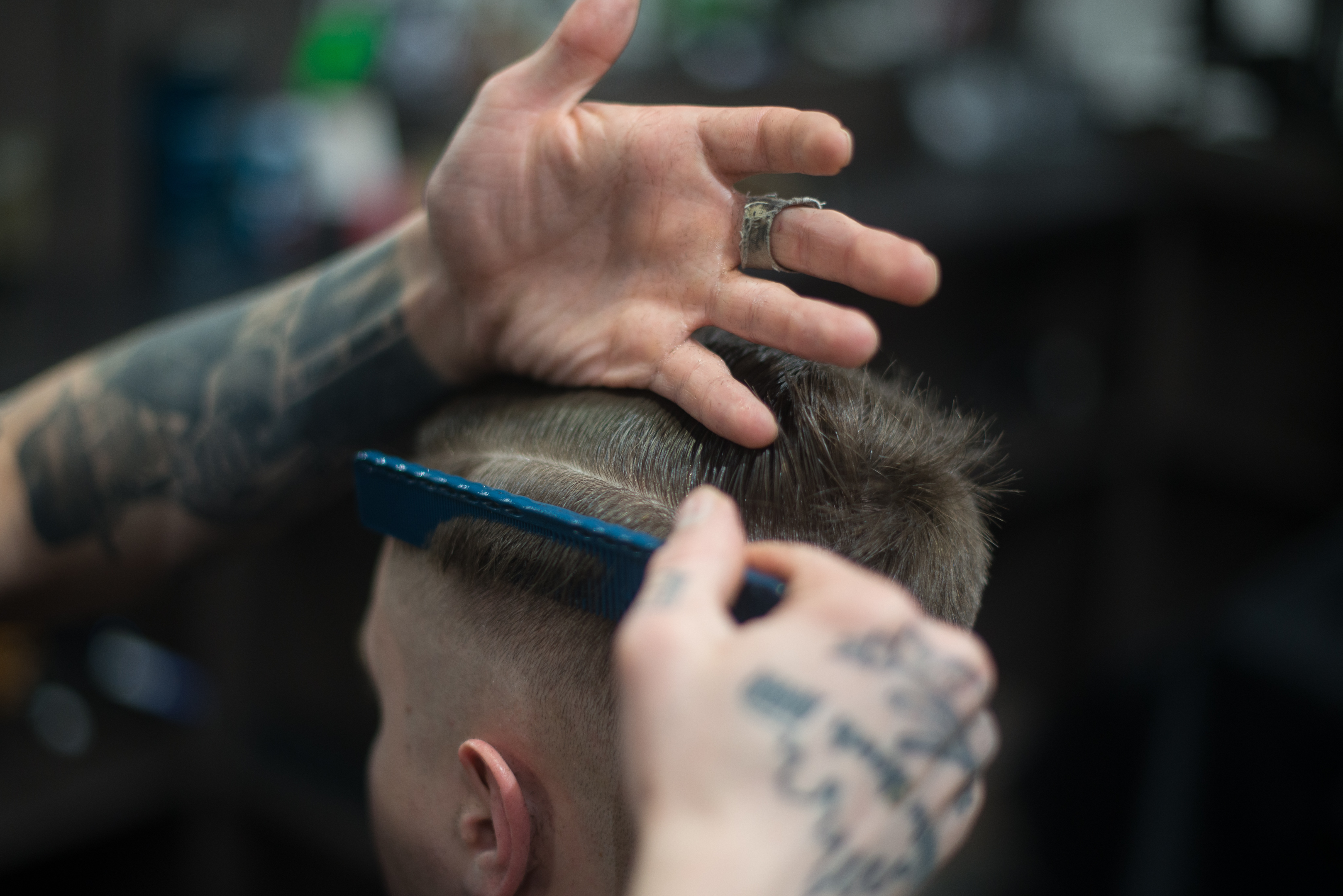Last Updated on: 17th September 2023, 12:49 pm
It’s no secret that male pattern baldness is a very common fear for young men. After all, who wants to experience hair loss at such a young age? And who wants to see their once thick and lush hair receding back from their forehead? Unfortunately, hair loss is something that many men will have to face at some point in their lives. But it’s important to remember that hair loss is not the end of the world, there are preventive actions that can help minimise the risk of hair loss.
Keep on reading to see the earliest sign of hair loss and what you can do to minimise the damage.

What causes male pattern baldness?
- Unhealthy hair follicles
It’s natural for hair follicles to go through a natural hair growth cycle. The phase consists of:- Anagen that can last for several years
- Followed by a regression phase (catagen) that lasts about two weeks
- After the regression phase, there is a short resting phase (telogen)
- Exogen, the shedding phase. It’s a phase where old hair will fall out and make room for new hair growthNormally, most hair follicles are in the growth phase at any given time, with the remaining in the regression or resting phases. However, when hair follicles are unhealthy, they may spend more time in the regression or resting phases. As a result, the hair that does grow back may be thinner and less lustrous. In extreme cases, this can lead to balding. That’s why keeping healthy hair follicles is so important.
- Genetic
Androgenetic alopecia, also known as male pattern baldness, is the most common type of hair loss in men. It is thought to be caused by a combination of genetic and hormonal factors. Androgenetic alopecia is known to be an inherited trait, passed down from both sides of the family.Androgenetic alopecia typically begins with a receding hairline and a bald spot on the crown of the head. As it progresses, the hair becomes thinner. In severe cases, all of the hair on the scalp may be lost. Treatments recommended by Trichologists are available to slow its progression and improve the appearance of thinning hair. - Diet
A healthy diet is important for overall health, but it may also play a role in preventing balding. Studies have shown that men who consume a diet high in protein and essential nutrients are less likely to suffer from hair loss than those who consume a diet lacking those nutrients.While there are many causes of balding, including genetics and ageing, an unhealthy diet is one factor that can contribute to this condition. By ensuring that you consume adequate amounts of protein and essential nutrients, you can help to keep your hair healthy and prevent hair loss. - Alopecia areata and illness
There are a number of reasons why a man might start to lose his hair, but illness and alopecia areata are two of the most common culprits. Alopecia areata is an autoimmune disorder that causes the body to attack hair follicles, resulting in patchy hair loss.Illness can also lead to hair loss, as can certain medications or treatments. In some cases, balding may be genetic, but it can also be the result of unhealthy lifestyle choices and experiencing excessive stress. - Stress
When people think of hair loss, they typically think of men who are going bald. However, hair loss can be caused by a variety of factors, including stress. While it is true that male pattern baldness is the most common form of hair loss, telogen effluvium, or temporary hair thinning, can also be caused by stress.When a person experiences a significant amount of stress, it can cause telogen effluvium by disrupting the natural growth cycle of the hair follicle. Normally, the hair follicle goes through a growth phase followed by a resting phase. However, when a person is under a lot of stress, the hair follicle can enter the resting phase prematurely.As a result, the individual may experience telogen effluvium, which can lead to thinning hair or even baldness. Fortunately, telogen effluvium is usually temporary and the hair will eventually grow back once the stressor has been removed. However, if the stressor is not removed and telogen effluvium continues for an extended period of time, it could lead to permanent hair loss.

At what age do men start losing hair?
According to a source from American Hair Loss Association,
- By the age of 35, two-thirds of American men will experience some degree of hair loss
- 85% of men will have significantly thinner hair by the age of 50
What’s the earliest age that man may develop male pattern hair loss?
While male pattern hair loss can occur at any age, it typically begins to present itself around the age of 25. However, there have been cases of men as young as 21 experiencing noticeable thinning or receding hairlines. Male pattern hair loss is caused by a combination of factors, including genetics, hormones, and ageing. It usually affects the crown and temples first, and can eventually lead to baldness. Here are some of the earliest signs of hair loss you should look out for:
- Thinning hair
- Thinning crown
- Receding hairline
Hair loss in men may increase with age but most men start to experience hair loss in their mid to late twenties.
How quickly does male hair loss progress?
For many men, hair loss is a slowly progressive process that can start in their twenties or thirties. In some cases, however, hair loss can be more sudden and dramatic. There are a number of factors that can affect the rate of hair loss, including genetic predisposition, health conditions, and stress levels.
In general, though, male pattern baldness progresses relatively slowly, with most men losing a small amount of hair each year. For some men, this slow process may eventually lead to complete baldness. Others may retain some thinning hair along the sides or back of the head. In any case, it is important to consult with a Trichologist to reduce or prevent male pattern baldness. Early intervention may help to slow the progression of hair loss and preserve your existing hair.
If you act quickly, your Trichologist can advise you on the treatment options to reduce further hair loss or to protect your healthy hair growth cycles.







